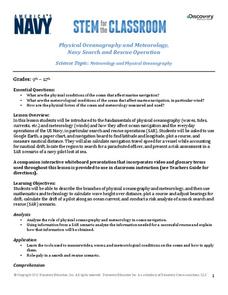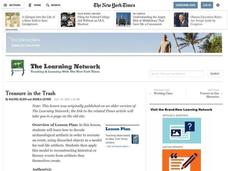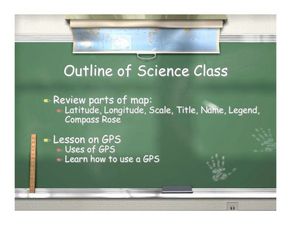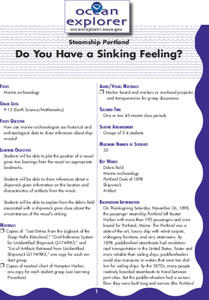Curated OER
Do You Need a Map?
Students explain ways marine navigation is important in modern society. In this map study instructional activity students use a retrieval tool to obtain real-time information on weather forecasts.
Curated OER
The Wild Dolphin Project
Inspire young marine biologists to study animals in the wild with this assignment. Pupils view an eight-minute video and read an article in the New York Times about Denise Herzing's 25-year long study of dolphins in their own natural...
Curated OER
What Do You Know About Horseshoe Crabs?
Students create a learning tool based on information given on the assigned website. In this ocean life instructional activity, students read about the horseshoe crab and develop a worksheet, scavenger hunt, board game or any tool to aid...
Curated OER
Ancient Hunters of the Great Lakes
Students describe theories on how the first humans came to America and show the evidence that supports it. In this investigative lesson students study given material and prepare written or oral reports in their groups.
Curated OER
Sea No Evil
Students research the characteristics of marine life at different ocean depths. They use their findings as the basis for a classroom 'Life Under the Sea' museum exhibit.
Curated OER
Monitoring Coral Reefs
Students investigate data on coral reef monitoring in a marine protected area in the Florida keys. In this coral reef lesson plan, students use online data from a marine protected coral reef to complete a worksheet about coral...
Curated OER
Compass Building Instructions
Students build their own compass following a given procedure. In this technology lesson, students explain how a compass is used in navigation. They trace the history of its development.
Curated OER
Small Wonders
Pupils investigate some of the 'mysteries' of the animal, marine and insect worlds, and create student books explaining their findings to younger students.
Curated OER
The Iron Cheesebox
Students describe the oxidation/reduction reactions that are involved in the corrosion of iron in seawater. In this marine sanctuary lesson students study the steps in conserving marine archaeological artifacts.
Curated OER
Internet Activity-Choose a Fish
Students research fish. In this marine biology lesson, students use the Internet to research a specific fish and their habitat, range, and size. Students fill in a worksheet with their notes.
Discovery Education
Physical Oceanography and Meteorology, Navy Search and Rescue Operation
It's an ocean rescue mission! Groups must find a pilot downed off the coast of the Chesapeake Bay. Rescuers must determine the distance needed to travel as well as the heading to get to the pilot's last known position. Taking into...
Space Awareness
Britannia Rule the Waves
Could you determine longitude based on measuring time? Early explorers used a longitude clock to do just that. Scholars learn about early exploration and the importance of the invention of the clock. Then pupils build their own longitude...
Discovery Education
Sonar & Echolocation
A well-designed, comprehensive, and attractive slide show supports direct instruction on how sonar and echolocation work. Contained within the slides are links to interactive websites and instructions for using apps on a mobile device to...
Curated OER
Personalized Masts
Students will use modern International Marine Code Flags to create representations of their names. They will use the inspiration of the sailing vessels to name and create a coat of arms for their ship.
Curated OER
Stranded along the Coast
Students plot stranding sites onto a map using latitude and longitude as well as compass directions with respect to coastal features. They identify several species of marine animals that might become stranded; distinguish their...
Curated OER
Sunken Hazard
Learners use information about past oil spills to predict potential effects of the Prestige spill on the environment, on marine life, and on the human culture and economy of Spain.
Curated OER
Treasure in the Trash
Students decode archaeological artifacts in order to recreate an event, using discarded objects as a model for real-life artifacts. They apply this model to reconstructing historical or literary events from artifacts they create.
Curated OER
Lesson on GPS
Students investigate global positioning systems. In this technology and mapping lesson plan, students view a PowerPoint presentation in which they identify the features of a GPS, state its uses, and follow steps to find a waypoint.
Curated OER
Do You Have A Sinking Feeling?
Students plot the positions of vessels given bearings in the form of landmarks. They explain how the debris field can help solve the mystery in how the ship sunk.
Curated OER
How to Catch a Fish
Pupils conduct an experiment to demonstrate the effects of different fishing methods. In this commercial fishing lesson students create posters and public announcements to share their information.
Ocean Explorer
Looking for Clues
Upper graders become "shipwreck detectives" by studying the debris field from a shipwreck in the Aegean Sea which took place in the 700s. A website is accessed that gives specific information about the debris field, and pairs of young...
Curated OER
Descending to the Challenge: Developing Documentaries About the Deep Ocean
The video clip that comprises the warm up is not available, but the related article from The New York Times and the movie trailer for Aliens of the Deep are, leaving enough material to make this a fascinating lesson on deep-sea...
Curated OER
Creature Seekers
Does it actually exist? Consider the sighting of a giant squid, much like the one that appears in 20,000 Leagues Under the Sea. Middle and high schoolers read the article One Legend Found, Many Still to Go, and research other mysterious...
Curated OER
Tides - The Ins and Outs of Tides
Get your junior oceanographers to generate tidal prediction graphs on an interactive website. They will feel like experts in the field, or shall we say, experts in the ocean! This is a brief, but worthwhile activity that could be used to...

























